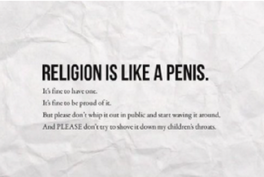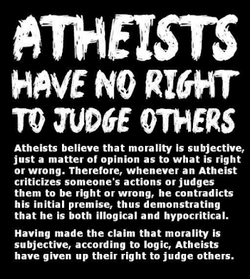Atheism
Agnostic atheism doesn't believe but also doesn't think we can ever know whether a god exists. A gnostic atheist, on the other hand, believes with certainty that a god does not exist. Christian atheism is a form of Christianity that rejects the theistic claims of Christianity, but draws its beliefs and practices from Jesus' life and teachings as recorded in the New Testament Gospels and other sources. Implicit atheism: "the absence of theistic belief without a conscious rejection of it". Negative atheism refers to any type of non-theism other than positive atheism, wherein a person does not believe in the existence of any deity, but without asserting there to be none. Also called "weak atheism".
Atheists Applaud Supreme Court’s Rejection of Effort to Limit Medication Abortion
Today, the Supreme Court of the United States unanimously rejected a lawsuit brought by the Christian nationalist law firm, Alliance Defending Freedom, seeking to prevent millions of Americans from accessing the safe and effective abortion medication, mifepristone. The opinion found that, “Under the Constitution… a plaintiff’s desire to make a drug less available for others does not establish standing to sue.” In response to the ruling, Alison Gill, Vice President of Legal & Policy for American Atheists, released the following statement: We are relieved the Court has confirmed the rules of standing still apply, even to Christians, as we argued in an amicus brief we filed in January. Although this is a significant victory for reproductive rights, we must never allow the extremist religious beliefs of a few—no matter how powerful they are—to violate the rights and wellbeing of the many. (American Athiests 6/13/24) READ MORE>>>>>
Today, the Supreme Court of the United States unanimously rejected a lawsuit brought by the Christian nationalist law firm, Alliance Defending Freedom, seeking to prevent millions of Americans from accessing the safe and effective abortion medication, mifepristone. The opinion found that, “Under the Constitution… a plaintiff’s desire to make a drug less available for others does not establish standing to sue.” In response to the ruling, Alison Gill, Vice President of Legal & Policy for American Atheists, released the following statement: We are relieved the Court has confirmed the rules of standing still apply, even to Christians, as we argued in an amicus brief we filed in January. Although this is a significant victory for reproductive rights, we must never allow the extremist religious beliefs of a few—no matter how powerful they are—to violate the rights and wellbeing of the many. (American Athiests 6/13/24) READ MORE>>>>>
 Andy Bannister
Andy Bannister
If atheism were true, and we live in a godless universe, then we are living in a tragedy. No matter how high humanity may climb, everything ends in ruin eventually. But if Christianity were true, then no matter how dark things may look, we know that this is not the story’s end; that, ultimately, evil will be defeated and, after the last tear has fallen, there is love.
--Andy Bannister; Premier Magzine; Why your favourite stories are full of Christian meaning; Nov 29, 2023
--Andy Bannister; Premier Magzine; Why your favourite stories are full of Christian meaning; Nov 29, 2023
Judge rules in favor of atheist to have to Religious program removed from West Virginia parole requirements
CHARLESTON, W.Va. (WBOY) — The West Virginia Division of Corrections and Rehabilitation (WVDCR) has changed its parole requirements after a judge ruled in favor of an atheist inmate who claimed that he was denied parole because he did not want to participate in a religious program. Andrew Miller, who was incarcerated at Saint Marys Correctional Center for breaking and entering, filed a lawsuit against the WVDCR in April in the U.S. District Court of Southern West Virginia saying that the state would not accommodate his request for a non-religious substance abuse program. Although Miller was not in prison on a substance-related charge, Miller was enrolled in the program because he is in recovery from addiction and the program was a condition of his parole; the lawsuit said that Miller was denied parole multiple times because of his refusal to do the program. (Sam Kirk/WTRF 11/16/23)
READ MORE>>>>>
CHARLESTON, W.Va. (WBOY) — The West Virginia Division of Corrections and Rehabilitation (WVDCR) has changed its parole requirements after a judge ruled in favor of an atheist inmate who claimed that he was denied parole because he did not want to participate in a religious program. Andrew Miller, who was incarcerated at Saint Marys Correctional Center for breaking and entering, filed a lawsuit against the WVDCR in April in the U.S. District Court of Southern West Virginia saying that the state would not accommodate his request for a non-religious substance abuse program. Although Miller was not in prison on a substance-related charge, Miller was enrolled in the program because he is in recovery from addiction and the program was a condition of his parole; the lawsuit said that Miller was denied parole multiple times because of his refusal to do the program. (Sam Kirk/WTRF 11/16/23)
READ MORE>>>>>
Psalm 14:1: The fool hath said in his heart, There is no God. They are corrupt, they have done abominable works, there is none that doeth good.
I heard that now they've got a dial-a-prayer service for atheists. You call a number and nobody answers

Crude...maybe funny if there are actually people who think they see a similarity. But, this is an example of the mentality of the anti-theist. And that is not a type-o. I did not mean to write atheist...I truly mean anti-theist. Atheism as a tenant implies a non belief in God. An anti-theist does not believe God and wants you to know you are an idiot if you do. They value no ones beleifs but their own.....and show contempt for any belief they do not share.

Overheard: "It seems as though much of christian efforts in society isn't about "winning souls over for god" but forcing society to accept and follow their beliefs." Hmmmm, my observation is that "christian efforts" in society to "win souls" isnt gonna make the news. Once they step into the political realm then they are all over. 24 hours a day. 7 days a week. On multiple news channels. In the blogosphere world wide both pro and con. When little "Jimmy" next door accepts Jesus as his "personal savior" because Johnny was a "faithful" witness no reporter is knocking on the door to get the scoop.................There is something I just don't get about the mind of an apostate: Why do they think they only started thinking when they left God? ....................Is it possible to prove atheism? Is it possible to prove there is no God? Theoretically it is. One would have to have all knowledge of existence to say with certainty that there is no God. Obviously this is not achievable..........

To escape the existence of one God, the atheist is forced to posit the existence of an infinite number of universes – some of which, presumably, contain very powerful God-like beings of their own. All of this to escape from God. Who here is guilty of allowing their psychological desires to lead them to absurd conclusions?
According to the best scientific account of the origins of life, we emerged as the product of natural selection, in a struggle for survival, in which only the best-adapted genes got passed on to subsequent generations. Taking God out of this picture, you have to assume that our cognitive faculties were shaped only by the survival needs of Homo Sapiens in Palaeolithic Africa. If that’s true, then should we trust our cognitive faculties?
Perhaps it’s true that evolutionary pressures will generally carve out reliable belief-forming mechanisms. But why think that the mechanisms formed in our Palaeolithic ancestors are reliable in our very new environment? Why think that they would be reliable when forming beliefs about very abstract theories of philosophy and science, which have little bearing on our day-to-day survival? -Samuel Libbons; Aish
According to the best scientific account of the origins of life, we emerged as the product of natural selection, in a struggle for survival, in which only the best-adapted genes got passed on to subsequent generations. Taking God out of this picture, you have to assume that our cognitive faculties were shaped only by the survival needs of Homo Sapiens in Palaeolithic Africa. If that’s true, then should we trust our cognitive faculties?
Perhaps it’s true that evolutionary pressures will generally carve out reliable belief-forming mechanisms. But why think that the mechanisms formed in our Palaeolithic ancestors are reliable in our very new environment? Why think that they would be reliable when forming beliefs about very abstract theories of philosophy and science, which have little bearing on our day-to-day survival? -Samuel Libbons; Aish

"While atheists are sometimes un-persuaded by the arguments for God’s existence, they are still woefully unable to provide coherent and adequate answers to the most important questions of life related to the cause of the universe, the appearance of design, the origin of life, the reality of human free will and the existence of transcendent moral truth. Theists aren’t the only ones who have to answer these questions. If naturalism is true, naturalists have their own unique burden of proof." -J Warner Wallace

Excerpt from Thomistic Bent:
When I was debating this atheist, I asked him, ‘what would convince you there is a god?’ He said “If all the chairs in this room rose up, flew against the back wall, and spelled ‘I am here — God’ then I would believe there is a god.” I am not convinced he would believe if this happened. If he was consistent philosophically, his atheism would have some way of trying to account for it, that there is some type of natural law that we have not yet discovered. Why do I think this? Because they already do this in things they observe, like the DNA molecule.
Suppose that all the chairs did rise up and float against the back wall and spell out “I do exist — God” and this atheist does believe there is a god. Suppose then that he goes out and tells others that he believes there is a god. They ask him why, and he tells them about the chairs. Then the same thing happens to them….the chairs rise up and float against the back wall, and they believe there is a god. And so he goes out into the world and everywhere that he confronts an atheist, chairs rise up and float against the wall. Until finally, he tells a person that he believes in god, and the person asks why. He tells the person he believes because chairs rise up and spell things against the wall, saying that there is a god. The person then responds, ‘Oh, that happens all the time. That’s no evidence for god; that’s always happening.’
So the atheist complains that God is not giving enough miraculous evidence for His existence, but if you give enough evidence for His existence, they just take the abundance of that evidence and call it a natural event. Ask the atheist, ‘DNA has information. Do you think that at least shows there is an intelligence?’ They say, ‘No, DNA is a natural thing. It’s in everything.’ Thus if there is not enough evidence, the atheist complains, but if there is an abundance of evidence, they redefine the evidence and call it natural.
When I was debating this atheist, I asked him, ‘what would convince you there is a god?’ He said “If all the chairs in this room rose up, flew against the back wall, and spelled ‘I am here — God’ then I would believe there is a god.” I am not convinced he would believe if this happened. If he was consistent philosophically, his atheism would have some way of trying to account for it, that there is some type of natural law that we have not yet discovered. Why do I think this? Because they already do this in things they observe, like the DNA molecule.
Suppose that all the chairs did rise up and float against the back wall and spell out “I do exist — God” and this atheist does believe there is a god. Suppose then that he goes out and tells others that he believes there is a god. They ask him why, and he tells them about the chairs. Then the same thing happens to them….the chairs rise up and float against the back wall, and they believe there is a god. And so he goes out into the world and everywhere that he confronts an atheist, chairs rise up and float against the wall. Until finally, he tells a person that he believes in god, and the person asks why. He tells the person he believes because chairs rise up and spell things against the wall, saying that there is a god. The person then responds, ‘Oh, that happens all the time. That’s no evidence for god; that’s always happening.’
So the atheist complains that God is not giving enough miraculous evidence for His existence, but if you give enough evidence for His existence, they just take the abundance of that evidence and call it a natural event. Ask the atheist, ‘DNA has information. Do you think that at least shows there is an intelligence?’ They say, ‘No, DNA is a natural thing. It’s in everything.’ Thus if there is not enough evidence, the atheist complains, but if there is an abundance of evidence, they redefine the evidence and call it natural.
Nov 3, 2022: Christianity.com: What Is Christian Atheism?
First of all, what is this belief? In short, it denies any theistic claims the Bible makes. Meaning if Jesus claimed to be God, a Christian atheist would throw those passages out of the Bible—much like a Thomas Jefferson fashion.
However, a person who is a Christian atheist will still live by Jesus’ teachings. They will admire Jesus’ warnings to “turn the other cheek” (Matthew 5:38-40) and to “go the extra mile” (same chapter in Matthew).
In other words, they view Jesus as a good and moral teacher. They would see him as a figure similar to the Buddha or Mohammad. A prophet, but nothing more.
First of all, what is this belief? In short, it denies any theistic claims the Bible makes. Meaning if Jesus claimed to be God, a Christian atheist would throw those passages out of the Bible—much like a Thomas Jefferson fashion.
However, a person who is a Christian atheist will still live by Jesus’ teachings. They will admire Jesus’ warnings to “turn the other cheek” (Matthew 5:38-40) and to “go the extra mile” (same chapter in Matthew).
In other words, they view Jesus as a good and moral teacher. They would see him as a figure similar to the Buddha or Mohammad. A prophet, but nothing more.

April 29, 2022: A liberal activist who sells sex toys online is getting national attention for calling on Florida’s public schools to ban and even burn the Holy Bible over what he says are “obscene” and “harmful” passages.
Chaz Stevens of Deerfield Beach, Florida, wrote letters to superintendents in Miami-Dade County Public Schools and other school districts throughout the state asking them to “immediately remove the Bible from the classroom, library, and any instructional material” in their schools. -Christian Post
Chaz Stevens of Deerfield Beach, Florida, wrote letters to superintendents in Miami-Dade County Public Schools and other school districts throughout the state asking them to “immediately remove the Bible from the classroom, library, and any instructional material” in their schools. -Christian Post
Jan 25, 2022: Religion News Service: Secularism is not atheism. A new book explains why the distinction is so critical.
In the United States, secularism has become synonymous with atheism. But that’s a big mistake, argues Jacques Berlinerblau, a Georgetown University professor.
At its core, secularism is an approach to governance, writes Berlinerblau in his new book, “Secularism: The Basics.” And critically, it is one many religious people, not just atheists and agnostics, support.
In the United States, secularism has become synonymous with atheism. But that’s a big mistake, argues Jacques Berlinerblau, a Georgetown University professor.
At its core, secularism is an approach to governance, writes Berlinerblau in his new book, “Secularism: The Basics.” And critically, it is one many religious people, not just atheists and agnostics, support.
May 2, 2022: Independent Journal Review: SCOTUS Hands Major Victory to Christians, Strikes Major Blow to Angry Atheists
The city of Boston violated the free speech rights of a Christian group by refusing to include the group’s flag in a third-party flag-raising program, according to a unanimous Supreme Court ruling released Monday.
The city of Boston violated the free speech rights of a Christian group by refusing to include the group’s flag in a third-party flag-raising program, according to a unanimous Supreme Court ruling released Monday.

Apr 29, 2022: The Free Press: One Florida City Fights Atheists Over Prayer Vigil That They Say Violated Their First Amendment Rights
Eight years ago, amid a rash of shootings that injured several children, the police chief in Ocala organized a prayer vigil for government and city leaders.
Chief Greg Graham, who died in 2020 in a plane crash, did so at the behest of local faith leaders. The event, which the Ocala Police Department publicly promoted, was held downtown and open to everyone.
Eight years ago, amid a rash of shootings that injured several children, the police chief in Ocala organized a prayer vigil for government and city leaders.
Chief Greg Graham, who died in 2020 in a plane crash, did so at the behest of local faith leaders. The event, which the Ocala Police Department publicly promoted, was held downtown and open to everyone.

Atheists in Kenya (AIK) have termed the exercise of viewing bodies as outdated and unhygienic.
“The practice of public viewing of the bodies of the deceased during funerals is archaic, unhealthy, and defunct,” the group’s President Harisson Mumia stated.
He added that; “According to research, there are potential cognitive effects of having viewed a deceased body, something called “false recognitions.” -The Nairobian
“The practice of public viewing of the bodies of the deceased during funerals is archaic, unhealthy, and defunct,” the group’s President Harisson Mumia stated.
He added that; “According to research, there are potential cognitive effects of having viewed a deceased body, something called “false recognitions.” -The Nairobian

The Isle of Man reported today that "People who don’t believe in God could lead prayers before sittings of the House of Keys in future.
The recommendation comes from the house’s management and members’ standards committee, which was published this week
As it stands, the chaplain of the House of Keys leads prayers before every sitting."
ME: One of the dumbest things I have read today.
The recommendation comes from the house’s management and members’ standards committee, which was published this week
As it stands, the chaplain of the House of Keys leads prayers before every sitting."
ME: One of the dumbest things I have read today.
Nov 14, 2021: The Secular Web: Thinking and Unthinking Faith
Ross Douthat is a conservative American writer. The present essay is a critique of an opinion piece by him published in the New York Times (Douthat, 2021). That article is an exemplar of several themes common in contemporary Christian apologetics, and merits analysis.
Ross Douthat is a conservative American writer. The present essay is a critique of an opinion piece by him published in the New York Times (Douthat, 2021). That article is an exemplar of several themes common in contemporary Christian apologetics, and merits analysis.
|
If the term “atheism” simply describes a missing mental property (i.e. a lack of belief), then the definition is too broad to be meaningful. Given this new definition there would be no difference between an atheist and the armchair he’s sitting on; that is, an armchair also lacks a belief in God just like the atheist.
If the term “atheism” simply describes a lack of belief, then there can be no argument to support what is lacking. It is merely describing an absence of an opinion. Atheists, therefore, cannot support absence with any good reasons; for, in absence, there is nothing to support. This relegates their view to the same level of seriousness as an aversion to lima beans or boiled cauliflower. If the term “atheism” simply describes a lack of belief, then atheists like Richard Dawkins, Sam Harris, and Christopher Hitchens went to an awful lot of trouble writing books describing their missing mental property. As a matter of fact, I’m curious how the internet atheist should interpret Dawkins’ chapter title in The God Delusion: “Why There Almost Certainly is No God”. Perhaps he should read it as: “How My Lack of Belief Explains Why There is No God”. The point is: atheism is not a mental property nor does it describe someone’s psychology. Atheism is a proposition or a truth claim about the world; and that proposition is: God does not exist. The only way Dawkins, Harris, Hitchens, and others can make arguments for their view is if they actually have a view to begin with. As William Lane Craig and J.P. Moreland point out, “[A] redefinition of the word atheist trivializes the claim of the presumption of atheism, for on this definition, atheism ceases to be a view…” |
Excerpt from article by Peter Hitchens:
In their attempt to argue that effective and binding codes can be developed without a deity, atheists often mistake inferior codes - "common decency" - for absolute moral systems. The Golden Rule, or doing as you would be done by, is such a code. But the fact that men can arrive at the Golden Rule without religion does not mean that man can arrive at the Christian moral code without religion.
Christianity requires much more, and above all does not expect to see charity returned. To love thy neighbour as thyself is a far greater and more complicated obligation, requiring a positive effort to seek the good of others, often in secret, sometimes at great cost and always without reward. Its most powerful expression is summed up in the words, "Greater love hath no man than this, that a man lay down his life for his friends."
It is striking that in his dismissal of a need for absolute theistic morality, my late brother Christopher states that "the order to 'love thy neighbour as thyself' is too extreme and too strenuous to be obeyed." Humans, he says, "are not so constituted as to care for others as much as themselves." This is demonstrably untrue, and can be shown to be untrue, first through the unshakeable devotion of mothers to their children; through thousands of examples of doctors and nurses risking (and undergoing) infection and death in the course of caring for others; in the uncounted cases of husbands caring for sick, incontinent and demented wives (and vice versa) at their lives' end; through the heartrending deeds of courage on the battlefield, of men actually laying down their lives for others.
We all know these things happen. If we are honest, they make us uncomfortable because we are not sure that we could do such things, though we know them to be right and admirable. In a society where the absolute code has been jettisoned, and we have all become adept at making excuses for shirking such duties, selflessness of this kind will become less common, nursing less dedicated, wives more inclined to leave their babbling husbands in care homes to be looked after impersonally by paid strangers and perhaps encouraged gently down the slope of death, soldiers readier to save themselves while their comrades lie in pain within reach of the enemy. And there will always be a worldly relativist on hand (as there already is at every marriage break-up and every abortion clinic, and increasingly by the bedside of the old and sick) to say that this was only sensible, to urge that we do the easy thing, and to say that it is right to do so. CONTINUED HERE
In their attempt to argue that effective and binding codes can be developed without a deity, atheists often mistake inferior codes - "common decency" - for absolute moral systems. The Golden Rule, or doing as you would be done by, is such a code. But the fact that men can arrive at the Golden Rule without religion does not mean that man can arrive at the Christian moral code without religion.
Christianity requires much more, and above all does not expect to see charity returned. To love thy neighbour as thyself is a far greater and more complicated obligation, requiring a positive effort to seek the good of others, often in secret, sometimes at great cost and always without reward. Its most powerful expression is summed up in the words, "Greater love hath no man than this, that a man lay down his life for his friends."
It is striking that in his dismissal of a need for absolute theistic morality, my late brother Christopher states that "the order to 'love thy neighbour as thyself' is too extreme and too strenuous to be obeyed." Humans, he says, "are not so constituted as to care for others as much as themselves." This is demonstrably untrue, and can be shown to be untrue, first through the unshakeable devotion of mothers to their children; through thousands of examples of doctors and nurses risking (and undergoing) infection and death in the course of caring for others; in the uncounted cases of husbands caring for sick, incontinent and demented wives (and vice versa) at their lives' end; through the heartrending deeds of courage on the battlefield, of men actually laying down their lives for others.
We all know these things happen. If we are honest, they make us uncomfortable because we are not sure that we could do such things, though we know them to be right and admirable. In a society where the absolute code has been jettisoned, and we have all become adept at making excuses for shirking such duties, selflessness of this kind will become less common, nursing less dedicated, wives more inclined to leave their babbling husbands in care homes to be looked after impersonally by paid strangers and perhaps encouraged gently down the slope of death, soldiers readier to save themselves while their comrades lie in pain within reach of the enemy. And there will always be a worldly relativist on hand (as there already is at every marriage break-up and every abortion clinic, and increasingly by the bedside of the old and sick) to say that this was only sensible, to urge that we do the easy thing, and to say that it is right to do so. CONTINUED HERE



